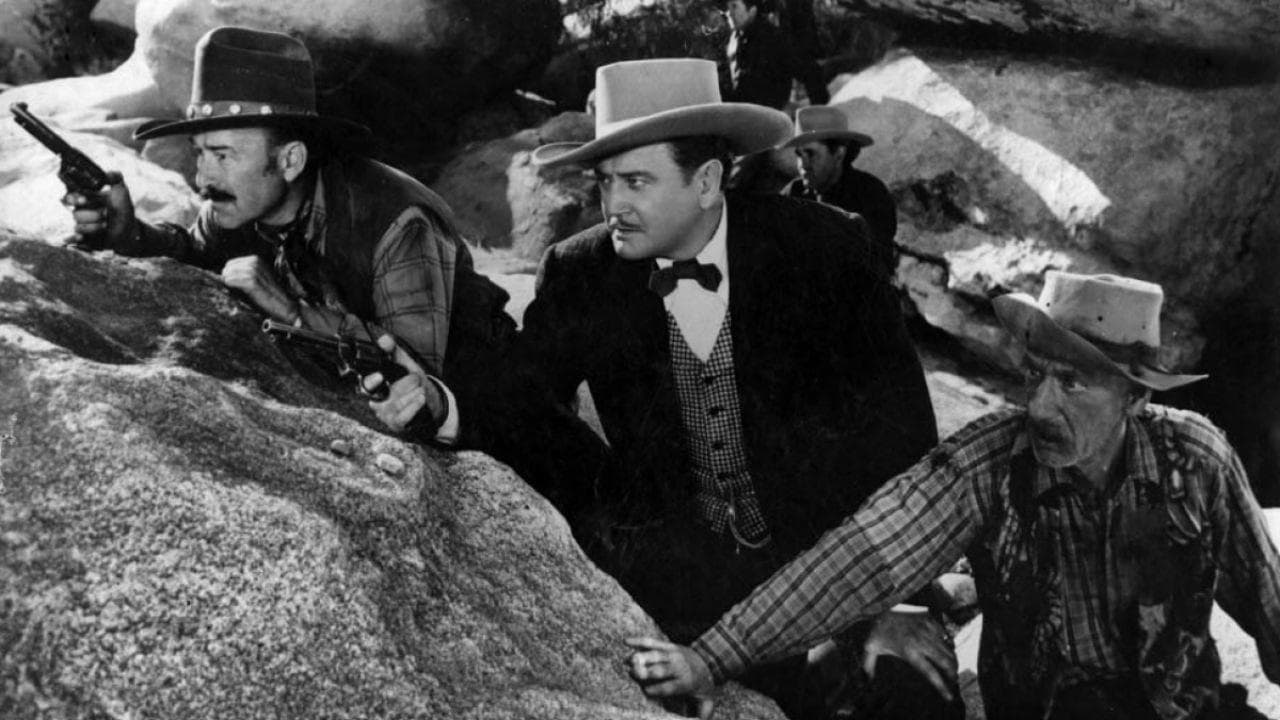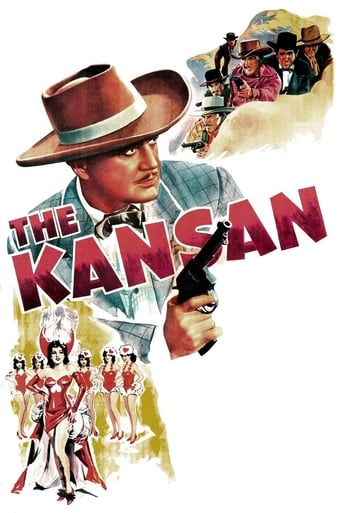



Self-important, over-dramatic, uninspired.
This is a tender, generous movie that likes its characters and presents them as real people, full of flaws and strengths.
View MoreIt's an amazing and heartbreaking story.
I enjoyed watching this film and would recommend other to give it a try , (as I am) but this movie, although enjoyable to watch due to the better than average acting fails to add anything new to its storyline that is all too familiar to these types of movies.
View MoreGraced with an awesome cast (the polecat Dix as a marshal due to his gun-play, a job he accepts because of the landlady, Jory as a gambler and the brother of a banker played by Dekker, Palette as the marshal's friend, Jane Wyatt as a landlady, but also W. Best playing a racial stereotype for which he must now be despised by the half-wits) and certainly the best saloon fight ever, 'The Kansan' is intriguing, neither romantic or historical, but the western equivalent of a political thriller with a good dramatic plot; it is Jory's movie, and a very good showcase for his dark glamor. The script wishes us to care more for the gambling gentleman, than for the righteous marshal.The cast has to be one of the choicest ever, because you never get the feeling that anyone is just giving a cameo; the saloon fight was made, fought, shot with a joy unsurpassed, with gusto and with the keenest sense of the slapstick, as a frenzied general fistfight.Jory plays a gambler who's also the marshal's friend, and perhaps wishes to get his brother's insurance, anyway a very well written character; he was a much better actor than Dix, and it shows. Now, perhaps Dekker was himself better than Dix, but here he got a character role, i.e. a walking cliché. As for the others, Palette was dependable (for me, he's the father in a screwball movie). Jane Wyatt seems less assured or convincing, in a role better handled by other actresses in, certainly, other movies.
View MoreAny film with Richard Dix is worth a chance not only because he's a likable and powerful figure but he seemed to bounce around the edges of the studio system so that his films vary standard formulas in unpredictable ways. The Kansan's saloon sets are excellent, for instance, and the crowds well directed--other posts mention the remarkably modern dance number (with perspectival backdrops) and the extended brawl with well-choreographed sequences and character highlights. Outdoor cinematography at the toll-bridge across which several incidents of the plot transpire featured impressive depth and angle.A big stable of acting talent also raises this film's quality, but I'll let other posters provide those kudos.My only difference with other posters is their near-blanket condemnation of the Bones character played by the terrific William Best. Certainly most of the film's racial dynamics are regrettably stereotypical, but Dix and Best interact as two smart guys recognizing each other. The film's single best moment for me was when the Jory character enters Best's servant quarters at the Sager Hotel. When Jory walks in, the Bones character is READING, which suggests that not just Willie Best but his character knows that Bones's minstrel persona is an act. Further, when Jory leaves the room, the door swings shut to reveal a portrait of Lincoln.
View MoreBystander Richard Dix stops a bank robbery by the James gang. Badly injured, he awakens to find himself unwittingly elected the town's new marshal, at the behest of local bank president Albert Dekker, who turns out to be a tyrant who wants Dix firmly under his thumb, a position the marshal has no plans to assume.The best things about this are the presence of Dix and Dekker, as well as a rowdy saloon fight that has people swinging from chandeliers and rioting uncontrollably. Everything else is too derivative and too mediocre to be memorable.Look fast for George Reeves as Jesse James.
View MoreThis obscure 'B' Western stands a cut above most with some creative writing and rather good performances by the principals. The film also offers a number of elements that I hadn't seen before after reviewing almost three hundred Westerns in this forum. Though a standard feature for this venue, the barroom brawl here is one of the longest and best staged fights you'll ever see, initiated by cattleman Tom Waggoner's (Eugene Palette) response to a couple of cowpokes who reach for their guns (see my summary line above). Once the fur starts to fly, you'll notice a couple of saloon girls join the action, and they manage to get the upper hand in their respective segments.Speaking of saloon girls, there was also a spirited song and dance rendition of 'When Johnny Comes Marching Home' by an actress who wasn't the female lead, another rarity. For that role, it was a surprise to see Jane Wyatt in an early film appearance, looking rather gorgeous as the hotel manager in Broken Lance. She spends her time in the film balancing her affections between the picture's star, Richard Dix, and Victor Jory, portraying the brother of town boss, Steve Barat (Albert Dekker). Jory always manages to succeed well in his roles, and is one of the few actors who can pull off hero and villain roles just as easily. In this one he straddles the fence for pretty much the entire picture, keeping you guessing on which way he'll turn by the finale. Speaking of which, one gets a fairly good impression that Jory's character didn't make it, but if this was a serial, he would have shown up in the next chapter.Then there's Willie Best in a comic relief role, used unfortunately to so much of the stereotype of a scaredy cat black man when facing danger. There was also an unfortunate line uttered by John Bonniwell (Dix) when he asked 'Bones' to "Come here boy". This was a pretty common occurrence in pictures of the era, and subliminally comes across as racist. With today's rarefied sense of political correctness, the comment was certainly noticeable, however Bonniwell treated Bones well throughout the rest of the picture.As for the story, a couple other reviewers do a good job of explaining the basic plot, so I won't dwell on that. With my viewing, I was on the lookout for supporting and uncredited actors that often pop up in these oaters, and "The Kansan" is a gold mine if you pay attention. Robert Armstrong is a Waggoner cattleman behind a mustache, and Rod Cameron is on board as a cowhand. It's easy to miss George Reeves in that quick shoot 'em up opening scene as Jesse James, while Jason Robards Sr. operates as one of Steve Barat's bank tellers. The rest of the uncredited cast holds a whole pile of bit actors whose names pop up in Westerns all up and down the Forties and Fifties.
View More